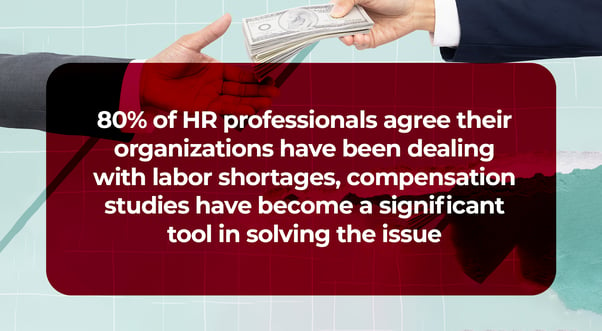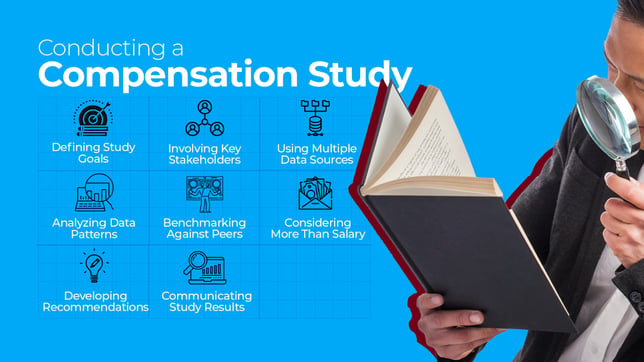HR and Payroll professionals must stay continually updated with high-quality data for optimal decision-making. Compensation is one of the most important subjects you can study in this context.
Employee Compensation Studies
A compensation study is a systematic analysis of employee compensation data from both within and outside an organization, including data on salaries, bonuses, perks, and benefits. Its objective is to assess the competitiveness of an organization’s compensation packages.
This analysis can help HR professionals revise the different components of compensation packages as well as identify where they are overpaying or underpaying their employees, develop strategies for attracting and retaining the best talent, and ensure their practices are fair and equitable. At a time when 80% of HR professionals agree their organizations have been dealing with labor shortages, compensation studies have become a significant tool in solving the issue.

While these studies can be conducted by in-house HR teams, they can also be outsourced to consulting firms with specific experience in this discipline. Additional information can also be gathered from published surveys undertaken by organizations like the Society for Human Resource Management.
Benefits of Employee Compensation Studies
The benefits of a robust compensation study include:
Remaining Competitive in the Market
A 2022-2023 report by SHRM found that not offering “competitive compensation has been an even greater barrier to recruitment” in 2022 than in 2021. To attract and retain top talent, organizations need to study the market before designing compensation packages.
Understanding Where Companies Fall Short
A compensation study can help organizations identify roles for which they may be paying below-market rates. Companies must look into the wider spectrum of compensation offered by competitors to see where they fall short. Components such as bonuses, commissions, benefits, stock options, insurance, PTO, flexible work arrangements, and initiatives for employee growth are particularly relevant.
Adjustments on New and Current Hires
HR and Payroll professionals can use compensation studies to determine the appropriate salary range for new hires and make adjustments to the salaries of existing employees. It can help reduce unfair pay disparities within an organization based on position and experience.
Saving Money in Certain Functions
Compensation information can be used to develop strategies for reducing costs by benchmarking salaries and budgets against industry standards. It can also help identify which departments within the company are soaking up too many resources, in terms of compensation. A robust and fair study should allow you to do so without sacrificing employee satisfaction.
Improved Employee Morale and Engagement
Employees are more likely to be satisfied with their jobs and engaged in their work if they feel that they are being compensated fairly. A 2022 study found that a robust compensation policy mediates employee morale and significantly increases engagement in the workplace.
Long-Term Strategic Planning
Gathering and analyzing data from compensation studies can inform long-term HR and organizational strategies. This can cover efforts like improving the employer brand and market position,, budget allocation, appropriate incentivizing, and the development of a meaningful company culture.
Reduced Legal Risks
Organizations that can demonstrate their compensation practices are fair and equitable are less likely to face legal challenges from employees. A compensation study can help organizations document their compensation practices and ensure they comply with all applicable laws and regulations.
Conducting a Compensation Study
The steps involved in conducting a compensation study vary depending on the size and complexity of the organization. There are some general steps, however, that all HR professionals should seek to include.

- Defining Study Goals: Organizations should begin by establishing clear objectives for the compensation study. For instance, HR professionals can determine whether the focus of the study is on attracting talent and retaining talent, or identifying cost-saving areas. Similarly, they can also decide whether they are assessing salary competitiveness or looking for areas where benefits can be improved.
- Involving Key Stakeholders: A compensation study is not possible without the collaboration of employees across the organization. It should not be limited to just the HR department but must include department heads, executives, and third-party resources.
- Using Multiple Data Sources: To ensure a comprehensive and accurate analysis, data on salaries, bonuses, and other compensation elements should be gathered from both internal data, like your payroll and HR system, and external data, like salary surveys and job boards.
- Analyzing Data Patterns: Once the data is collected, the next step is to scrutinize it for trends and insights. This analysis can be carried out manually or with specialized software.
- Benchmarking Against Peers: HR professionals should analyze compensation packages in comparison to packages offered by other organizations in the same industry or geographic area if that is relevant.
- Considering More Than Salary: When reviewing compensation data, HR professionals must also factor in bonuses, benefits, and opportunities for career development.
- Developing Recommendations: Based on the analysis, HR departments need to craft well-informed recommendations including salary adjustments, policy adjustments, supplementary benefits, updated job descriptions, or new compensation programs.
- Communicating Study Results: Upon completion, the findings of the compensation study must be shared with key stakeholders. HR professionals should not overlook the importance of effective communication to ensure the study's results are understood and recommended improvements are put into practice.
The Experts in Compensation Studies
A well-executed compensation study can lead to improved employee morale and engagement, reduced risk of legal challenges, and the possibility of saving money on compensation costs.
HR professionals who do not have the resources or manpower to conduct it themselves can rely on The Human Resource Consulting Group. We can serve as both your full-time HR team or handle a specific task like carrying out a compensation study. Furthermore, our compensation management solution can help you streamline your compensation management with enhanced efficiency. HR Reporting and Analytics tools can also help with making better informed decisions about compensation.
Schedule a consultation to speak with one of our HR Service professionals today! We’d love to share more about our robust compensation studies that draw upon data from your organization as well as our wealth of experience to help you optimize your decision-making and drive growth.
Author: Robin Imbrogno
 Robin Imbrogno is the founder of The Human Resource Consulting Group. Robin is a recognized leader in the business community as a member of the Society for Human Resource Management (SHRM), The American Payroll Association (APA), The Independent Payroll Providers Association (IPPA), The Payroll Group (TPG) as Secretary on the Board of Directors, and a former recipient of the Association for Women in Communications award (WIC).
Robin Imbrogno is the founder of The Human Resource Consulting Group. Robin is a recognized leader in the business community as a member of the Society for Human Resource Management (SHRM), The American Payroll Association (APA), The Independent Payroll Providers Association (IPPA), The Payroll Group (TPG) as Secretary on the Board of Directors, and a former recipient of the Association for Women in Communications award (WIC).





